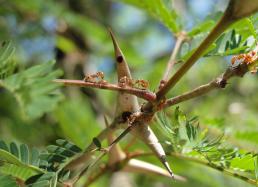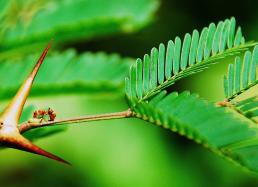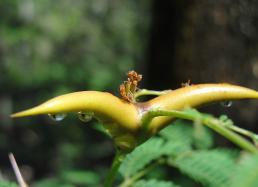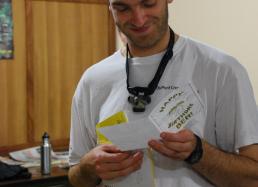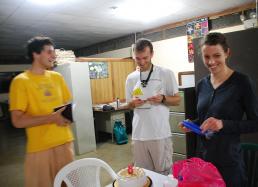Blog #9: Everybody Hates the Acacia Ant Guy
On the Schmidt Pain Index, the sting delivered by an acacia ant is rated as a one out of four—the lowest possible rating. This least-painful rating also applies to the sting of carpenter bees and army ants. Personally, a single acacia-ant sting reminds me of a sweat bee—painful, but easily forgotten. However, while I’ve only ever encountered a single sweat bee at a time, I’ve never been stung by just a single acacia ant.
Acacia-ant colonies are composed of many thousands of individuals, and approaching a nest makes every one of them sprint outside with stingers cocked. They will, quite literally, leap from branches for the chance to land on and sting any trespasser, including people.
I study acacia ants exactly because of their aggressiveness. These ants (Pseudomyrmex sp.) live mutualistically with acacia plants. The acacias grow hollow thorns, sprout vegetable-like food bodies, and produce extra nectar specifically to house and feed the ants. In exchange for this protected nesting space and food, the ants aggressively protect their host plants (see Photos #1 and #2 below.)
In the Neotropics where these ants and plants live, “protecting” mostly means chasing off other plant-eating insects, but the ants also clean harmful, pathogenic fungi from their hosts, and even trim down nearby plants that could potentially compete with their acacias for resources.
The ants are incredibly effective; acacias without ant residents are quickly consumed by plant-eating insects and disease. I study the evolution of this highly specialized behavior in acacia ants. Unfortunately, studying acacia ants means collecting acacia ants, and collecting acacia ants means getting stung by acacia ants.
There’s plenty of warning that collecting acacia ants will be unpleasant. The acacias that host ants are commonly known as Bull’s-horn Acacias because of the size, sharpness, and devilish curving of their thorns (see Photo #3 below.) We try to protect ourselves as best we can by wearing long pants and long sleeve shirts and, especially, latex gloves so our hands don't swell up from stings (see above photo.)
But, despite our best efforts, the ants always get through. They’re fast and narrow and can get anywhere. They run up sleeves, down collars, under hats, and, inevitably, down pants. Getting stung while collecting acacia ants is expected, so we’re physically and emotionally prepared, but sometimes ants get caught in the crease of a shirt or a backpack pocket, which leads to an unanticipated sting in an unexpected place.
The most jarring part of collecting acacia ants is when, hours after the last collecting tube was closed, these lost ants make their way out of their hiding places and once again set forth on a mission to protect their nests by stinging everything they encounter.
One part of my research requires the collection of large numbers of ants from individual colonies which, in practice, means cutting branches off of trees and dissecting each thorn one at a time. We did these collections today, with everyone on the team participating (see our "Video Journal #4: Acacia Tree-dwelling Ants" and "Video Journal #5: Triplaris Tree-dwelling Ants.") The ants were justifiably upset by this activity and much stinging and responsive cursing ensued. It’s days like today that everybody hates the acacia ant guy.
Fortunately, it was also my birthday today (see Photos #4 and #5 below), so rather than spending the evening snubbing me for forcing them to be stung by hundreds of angry acacia ants, everyone instead secretly drove three hours round trip to get me a cake from town and presented it to me along with an impressively drawn card. Yep, we’ve put together a very good team.
Cheers,
Ben

